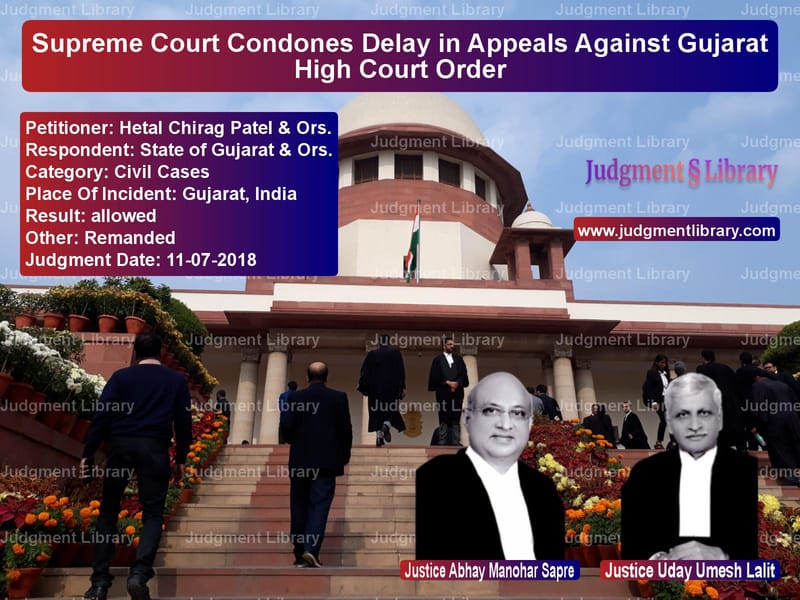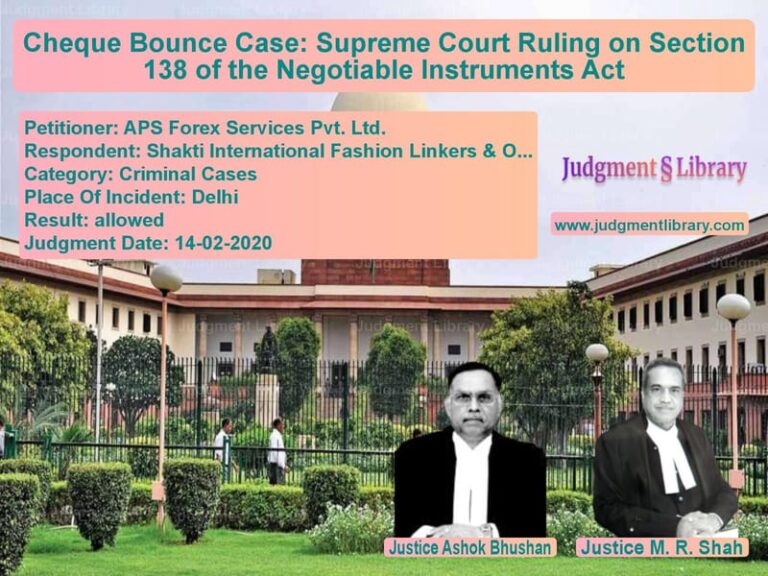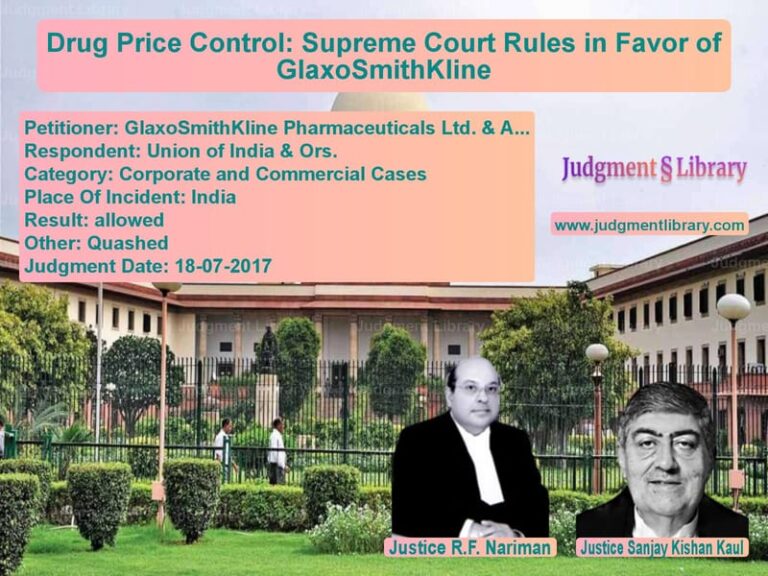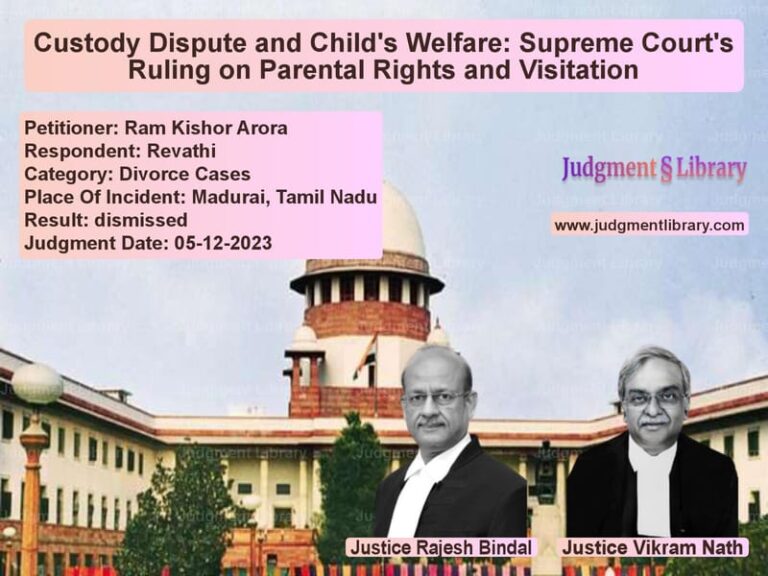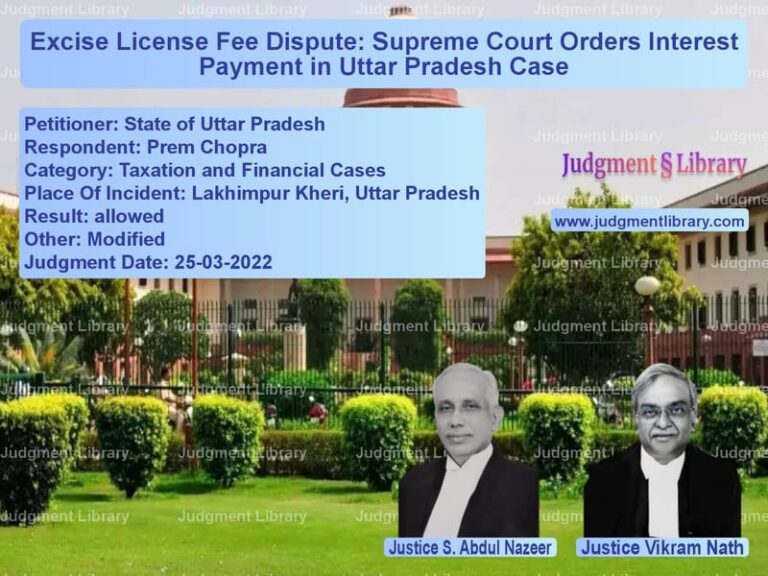Supreme Court Condones Delay in Appeals Against Gujarat High Court Order
The Supreme Court of India, in the case of Hetal Chirag Patel & Ors. vs. State of Gujarat & Ors., delivered a significant ruling regarding the condonation of delay in filing intra-court appeals before the Division Bench of the Gujarat High Court. The appellants had challenged the dismissal of their appeals due to a delay of 233 days. The Supreme Court ruled in favor of the appellants, allowing the condonation of delay and restoring the appeals for consideration on merits.
Background of the Case
The case originated from a series of writ petitions filed in the Gujarat High Court concerning administrative decisions affecting the appellants. The appellants were not originally made parties to the writ petitions but later became aggrieved by the decisions of the Single Judge. Seeking to challenge these decisions, they filed intra-court appeals before the Division Bench.
However, the Gujarat High Court’s Division Bench dismissed their appeals solely on the ground of delay, stating that no sufficient cause was made out under Section 5 of the Limitation Act, 1963. The appellants then approached the Supreme Court through special leave petitions, contesting the dismissal.
Key Legal Issues Considered
- Whether the delay of 233 days in filing the intra-court appeals could be condoned under Section 5 of the Limitation Act.
- Whether the appellants had sufficient cause for the delay in filing their appeals.
- Whether the Gujarat High Court erred in dismissing the appeals without considering the merits of the case.
Arguments Presented
Arguments by the Appellants
- The appellants contended that they were not made parties to the original writ petitions and only became aware of the adverse orders at a later stage.
- They argued that the delay was unintentional and resulted from procedural complexities, not deliberate negligence.
- Their appeal involved important legal and factual issues that warranted adjudication on merits rather than dismissal on technical grounds.
- They cited previous Supreme Court judgments where delays were condoned in the interest of justice, particularly in cases involving administrative and procedural challenges.
Arguments by the Respondents (State of Gujarat & Ors.)
- The respondents maintained that the law requires timely filing of appeals, and condoning such a long delay would set a bad precedent.
- They argued that no sufficient cause was demonstrated by the appellants to justify condonation of delay.
- They contended that granting such relief would encourage casual and negligent litigation practices, burdening the judicial system.
- The respondents asserted that the Gujarat High Court had correctly exercised its discretion in dismissing the appeals based on procedural grounds.
Supreme Court’s Observations
The Supreme Court examined the matter in light of established legal principles regarding condonation of delay. The Court observed:
“Having heard learned senior counsel/learned counsel for the parties and on perusal of the record of the case, we are inclined to condone the delay in filing the appeals by the appellants before the Division Bench of the High Court.”
The Court emphasized that the appellants were not originally made parties to the writ petitions, which constituted a sufficient cause for delay:
“In our opinion, having regard to the facts and circumstances of the case and further keeping in view of the fact that the appellants were not made parties to the original writ petitions and became aggrieved by the order passed by the writ Court (Single Judge) in the writ petitions, a case for condonation of delay in filing the appeals was made out.”
The Supreme Court criticized the Gujarat High Court’s approach, stating that procedural delays should not override substantive justice. It reiterated that courts should adopt a liberal approach when considering applications for condonation of delay, especially when the delay is not deliberate.
Final Judgment
The Supreme Court ruled as follows:
- The appeals were allowed, and the Gujarat High Court’s decision dismissing the appeals on grounds of delay was set aside.
- The intra-court appeals were restored to their respective files for fresh adjudication on merits.
- The Gujarat High Court’s Division Bench was directed to hear and decide the appeals expeditiously.
- The Court made it clear that it had not expressed any opinion on the merits of the case and had confined itself to the issue of condonation of delay.
Impact of the Judgment
This ruling has significant implications for the judicial system and litigants:
- Emphasis on Substantive Justice: The judgment reinforces that courts should prioritize deciding cases on their merits rather than dismissing them on technicalities.
- Flexible Approach to Delay: It establishes that procedural delays should not deprive litigants of their right to appeal when a reasonable cause exists.
- Guidance for High Courts: The decision serves as a precedent for High Courts to adopt a more pragmatic approach when considering applications for condonation of delay.
- Fairness in Judicial Proceedings: The ruling ensures that parties who were not originally part of a case but later become affected have a fair chance to present their arguments.
Legal Precedents Considered
The Court referred to several landmark cases on condonation of delay, including:
- Collector, Land Acquisition vs. Mst. Katiji & Ors. (1987): The Court ruled that a liberal approach should be taken in condonation of delay cases to advance substantial justice.
- State of Haryana vs. Chandra Mani & Ors. (1996): It was held that courts should not adopt a pedantic approach and should ensure that genuine cases are not dismissed on technical grounds.
- Balwant Singh vs. Jagdish Singh & Ors. (2010): The Supreme Court clarified that while delays should not be condoned in every case, substantial causes for delay should be considered favorably.
Conclusion
The Supreme Court’s ruling in Hetal Chirag Patel & Ors. vs. State of Gujarat & Ors. highlights the judiciary’s commitment to ensuring that cases are heard on their merits rather than being dismissed on procedural grounds. By allowing the condonation of delay, the Court has reaffirmed the principle that justice should not be denied due to technical reasons. This decision serves as an important precedent for future cases involving delay in filing appeals, particularly where parties were not originally included in the litigation but later became affected by its outcomes.
Petitioner Name: Hetal Chirag Patel & Ors..Respondent Name: State of Gujarat & Ors..Judgment By: Justice Abhay Manohar Sapre, Justice Uday Umesh Lalit.Place Of Incident: Gujarat, India.Judgment Date: 11-07-2018.
Don’t miss out on the full details! Download the complete judgment in PDF format below and gain valuable insights instantly!
Download Judgment: Hetal Chirag Patel & vs State of Gujarat & O Supreme Court of India Judgment Dated 11-07-2018.pdf
Direct Downlaod Judgment: Direct downlaod this Judgment
See all petitions in Other Cases
See all petitions in Judgment by Abhay Manohar Sapre
See all petitions in Judgment by Uday Umesh Lalit
See all petitions in allowed
See all petitions in Remanded
See all petitions in supreme court of India judgments July 2018
See all petitions in 2018 judgments
See all posts in Civil Cases Category
See all allowed petitions in Civil Cases Category
See all Dismissed petitions in Civil Cases Category
See all partially allowed petitions in Civil Cases Category

